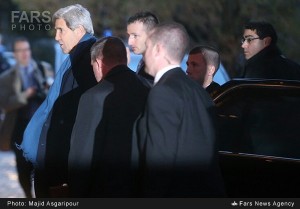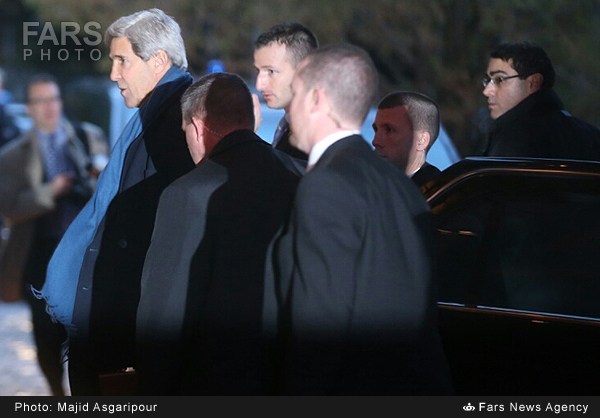 GENEVA - U.S. Secretary of State John Kerry arrived Saturday morning at Geneva , where senior American and Iranian diplomats said a breakthrough in the nuclear talks had been made and that an agreement between Iran and world powers over Teheran's nuclear program could be signed as soon as Saturday.
GENEVA - U.S. Secretary of State John Kerry arrived Saturday morning at Geneva , where senior American and Iranian diplomats said a breakthrough in the nuclear talks had been made and that an agreement between Iran and world powers over Teheran's nuclear program could be signed as soon as Saturday.A U.S. State Department spokesperson said just before Kerry took off for Geneva that he decided to go �"with the hope that an agreement will be reached."
Shortly after the Kerry's announcement, British Foreign Minister William Hague said he would also be traveling to Geneva for the Iran talks. French Foreign Minister Laurent Fabius also arrived in Geneva Saturday morning. Russian Foreign Minister Sergey Lavrov's had already arrived in Geneva Friday afternoon.
State Department spokesperson Jen Psaki said that Kerry's arrival did not mean a deal would necessarily be signed but that he was arriving "with the goal of continuing to help narrow the differences and move closer to an agreement."
Following the arrival of Lavrov in Geneva Friday evening, the Iranians began meeting for bilateral talks with the American delegation and with the representative of the other six powers at the talks. Until this evening, for the last two days talks with the Iranians were held only by the European Union's foreign policy chief Catherine Ashton representing the P5+1 group.
The arrival of Lavrov and Kerry in Geneva came at the same time as reports began coming out from the talks on progress toward an agreed draft on Iran's claim to a right to enrich uranium. While the Western powers refused to acknowledge that right in the interim agreement, the Iranian leadership defined that as a "red line." According to an Iranian source close to the delegation, the agreed draft may be based in Iran's status as a signatory to the Treaty on Non-Proliferation of Nuclear Weapons (NPT) which allows nations to develop nuclear power for peaceful purposes.
Despite the progress (which has not been confirmed by any official source) on the enrichment issue, another point of contention has risen - Iran's continued building of the heavy-water plutonium reactor at Arak. The demand to halt building, first raised by the French in the previous round of talks two weeks ago, was one of the reasons an interim agreement was not signed then. The Iranians claimed that there is no need to stop the building as they have no intention now of putting the reactor into use for another year. But nuclear experts in the West believe that if Iran is allowed to continue building the reactor over the next six months until a comprehensive agreement is achieved, it will be much more difficult to prevent its operation and use for military purposes. At this stage, it is unclear how an agreement on the Arak reactor may look.
For now it seems that the Iranians have been forced to accept the Western powers' refusal to ease the main sanctions on oil trade and banking and will have to make do with the interim agreement with much more limited sanction relief which will include unfreezing some Iranian assets (assessed at between $6-10 billion) and allowing Iran to import various goods.
No official spokesperson of the P5+1 group would comment on the content of the talks but Iranian deputy foreign minister Abbas Araghchi said this evening that sides "have gotten closer to an agreement."
By Haaretz�
The Iran Project is not responsible for the content of quoted articles.











